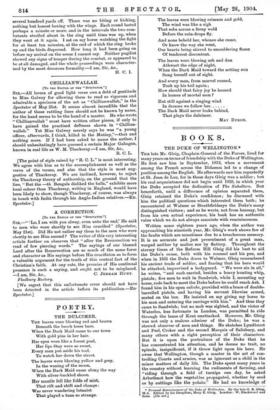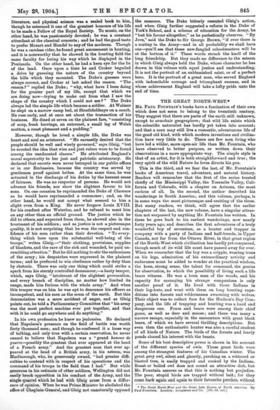THE late Mr. Gleig, Chaplain-General of the Forces, lived for
many years on terms of friendship with the Duke of Wellington. He first saw him in September, 1813, when a movement among the French across the Bidassoa led to a change of position among the English. He afterwards saw him repeatedly at St. Jean de Luz, for in those days Gleig was a soldier; but his real acquaintance did not begin until 1826, in which year the Duke accepted the dedication of The Subaltern. But henceforth, until a difference of opinion separated them, Gleig retained the Duke's confidence; he discussed with him the political questions which interested them both ; he encountered at Walmer or Strathfieldsaye the Duke's many distinguished visitors ; and as he wrote, not from hearsay, but from his own actual experience, his book has an authentic value which we do not always associate with reminiscences.
Written some eighteen years ago, when the author was approaching his ninetieth year, Mr. Gleig's work shows few of the faults which are sometimes due to a treacherous memory. It is an accurate and just presentment of a great man, warped neither by malice nor by flattery. Throughout the stormy times of the Reform Bill Gleig did his best to aid the Duke's cause, both with his counsel and his pen, and when in 1831 the Duke drove to Walmer, Gleig remembered his ancient trade of soldier, and fearing that his hero would be attacked, improvised a bodyguard. "We were six in all," he writes, "and each carried, besides a heavy hunting whip, pistols ; five men to wait in Sandwich, while I, mounting my horse, rode back to meet the Duke before he could reach Ash. I -found him in his open caleche, provided with a brace of double- barrelled pistols, and having his servant likewise armed, seated on the box. He insisted on my giving my horse to his man and entering the carriage with him." And thus they came to Sandwich; but no mob was sighted, and the victor of Waterloo, less fortunate in London, was permitted to ride through the lanes of Kent unattacked. However, Mr. Gleig was not only a zealous admirer of the Duke; he was a shrewd observer of men and things. He sketches Lyndhurst and Peel, Croker and the second Marquis of Salisbury, and many others with a right perception of their characters. But it is upon the portraiture of the Duke that he has concentrated his attention, and he deems no trait, no episode, insignificant, if it throw light upon his hero. He owns that Wellington, though a master in the art of con- trolling Courts and armies, was as ignorant as a child in the minor matters of daily life. The Duke spent many years in the country without learning the rudiments of farming, and "riding through a field of turnips one day, he asked Arbuthnot how the vegetables propagated, whether by seed or by cuttings like the potato." He had no knowledge of * Personal Reminiscences of the Duke of Wellington. By the late G. R. Gleig, M.A. Edited by his Daughter, Mary E. Gleig. London : W. Blackwood and Sons. [5s. net.]
literature, and physical science was a sealed book to him, though he esteemed it one of the greatest honours of his life to be made a Fellow of the Royal Society. To music, on the other hand, he was passionately devoted; he was a constant attendant at the classical concerts ; and he had the good taste to prefer Mozart and Handel to any of the moderns. Though he was a careless rider, be found great amusement in hunting, and it is noteworthy that he showed in the hunting field the same faculty for losing his way which he displayed in the Peninsula. On the other hand, he had a. keen eye for the lie of the land. Once upon a time he and Croker beguiled a drive by guessing the nature of the country beyond the hills which they mounted. The Duke's guesses were always correct, and Croker at last asked the reason. "The reason ? " replied the Duke ; "why, what have I been doing for the greater part of my life, except that which we are doing now—trying to make out from what I saw the shape of the country which I could not see ? " The Duke always led the simple life which became a soldier. At Weimer he slept on a narrow camp bed, at Strathfieldsaye on a couch. He rose early, and at once set about the transaction of his business. He dined at seven on the plainest fare, "consisting of soup, fresh herrings, an entremet, a small leg of Welsh mutton, a roast pheasant and a pudding."
However, though he loved a simple life, the Duke was heart and soul an aristocrat. "He earnestly desired that the people should be well and wisely governed," says Gleig, "but he scouted the idea that wise and just rulers were to be found among the uneducated classes." He attributed England's moral superiority to her just and patriotic aristocracy. He declared that secrets were never betrayed in our public offices or in our Embassies, because the country was served by gentlemen proof against bribes. At the same time, he was actuated in the discharge of his duties by the keenest sense of fairness. He was no respecter of persons. He would not advance his friends, nor show the slightest favour to his sons. On one occasion he reprimanded the Duke of Clarence as he would have reprimanded a commoner ; and, on the other hand, he would not accept what seemed to him a slight even from a Xing. He never forgave Louis XVIII. for his conduct after Waterloo, and he refused to meet him on any other than an official ground. The justice which he did to others, and expected from them, he showed also in the treatment of his soldiers ; and as justice is not a picturesque quality, it is not surprising that he won the respect and con- fidence of his men rather than their devotion. "To every- thing which bore upon the substantial well-being of the troops," writes Gleig,—" their clothing, provisions, supplies of blankets, and the care of the sick and wounded, he paid un- remitting attention." But he did nothing to stir the enthusiasm of the army ; his despatches were expressed in the plainest terms; and he preferred to win obedience rather by duty than by rhetoric. There was only one thing which could strike a spark from his sternly controlled demeanour,—a hasty temper, which, says Gleig, "intolerant of the slightest provocation, and every breach of discipline, no matter how limited its range, made him furious with the whole army." And when this temper was on him he was apt to denounce his officers as incompetent, and his men as the scam of the earth. But this denunciation was a mere accident of anger, and as Gleig points out, he told a Parliamentary Committee that "his army was the most perfect machine ever put together, and that with it he could go anywhere and do anything."
In his own profession he knew no jealousies. He declared that Napoleon's presence on the field of battle was worth forty thousand men; and though he confessed it a loose way of talking, and only true with a certain reservation, he never ceased to believe that Napoleon was a "grand homme de guerre—possibly the greatest that ever appeared at the head of a French army." And the greatest man that ever ap- peared at the head of a British army, in his esteem, was Marlborough, who, he generously owned, "had greater diffi- culties to contend with in respect of his operations and the command of his troops in the field than I had." But while generous in his estimate of other soldiers, Wellington did not easily brook opposition in his conduct of the Army, and the single quarrel which he had with Gleig arose from a differ- ence of opinion. When he was Prime Minister he abolished the office of Chaplain-General, and Gleig not unnaturally opposed the measure. The Duke bitterly resented Gleig's action, and when G-leig further suggested a reform in the Duke of York's School, and a scheme of education for the Army, he "lost his favour altogether," as he pathetically observes. "By Jove," said the Duke to Sir George Brown, "if ever there is a mutiny in the Army—and in all probability we shall have one—you'll see that these new-fangled schoolmasters will be at the bottom of it." These words struck the knell of the long friendship. But they made no difference to the esteem in which Gleig always held the Duke, whose character he has drawn in this volume with equal justice and understanding. It is not the portrait of an unblemished saint, or of a perfect hero. It is the portrait of a great man, who served England with indomitable courage and triumphant success, and in whose achievement England will take a lofty pride unto the end of time.







































 Previous page
Previous page